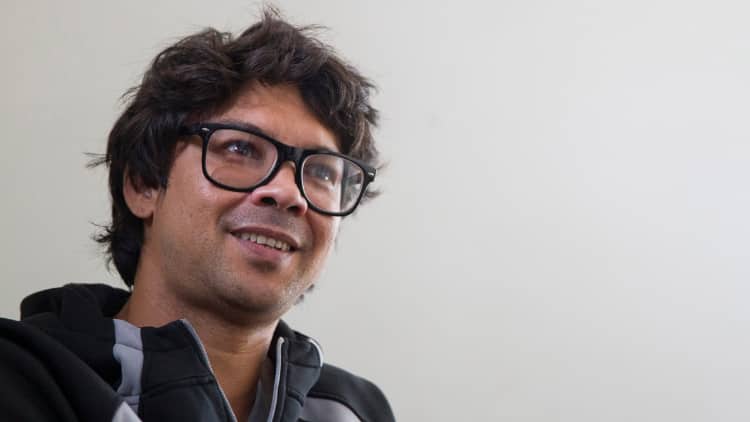The Diplomat
Cuban playwright Yunior García Aguilera, one of the main promoters of the ‘Civic March’ called for last Monday in Cuba -which the Castro regime managed to prevent with a large police deployment- arrived in Spain yesterday at two o’clock in the afternoon, accompanied by his wife.
García Aguilera and his wife, Dayana, travelled from the island on tourist visas for a short period of time (90 days) provided by the Spanish Consulate General in Havana, according to diplomatic sources consulted by The Diplomat.
The news came after opposition groups complained that there had been no news since Sunday of the playwright, who has been one of the most visible voices in the Archipiélago Group, the driving force behind the protests.
García Aguilera, 39, was locked up in his Havana home all day Monday, blocked by Cuban state security agents and cut off from the media by a Cuban flag draped over his building.
Cuban security forces prevented the Cuban activist and dissident from crossing the centre of Havana on foot in what was intended to be an advance on the protests called throughout the country to demand political change on the island, freedom of expression and the release of political prisoners.
The Cuban government assured that there had been no agreement between Havana and Madrid to facilitate the dissident’s departure from the country.
A representative of the Cuban government told Efe that the Cuban authorities “have nothing to do” with García Aguilera’s departure and considered that the activist had applied for a tourist visa on his own.
In any case, the departure from the country of a person as well known as the playwright would not be possible without the Castro regime giving him permission to do so, sources familiar with the Cuban situation told The Diplomat.
Tras la llegada a España, Yunior García se puso en contacto con otros miembros del Grupo Archipiélago para exponerles los motivos que le habían llevado a tomar la decisión de salir de Cuba, según explicó él mismo en una entrevista con Ian Padrón en el canal Derecho@Réplica. No se conocen cuáles son sus planes y si tiene intención de pedir asilo político en nuestro país.
Nor is it known what his plans are or whether he intends to seek political asylum in Spain.
Born in Holguín (east), Yunior García has long been known for his plays and his scripts for television and film.
But after 27 November 2020, when hundreds of artists demonstrated to demand greater freedom of expression, he became the representative of a new generation critical of the government, which includes artists, independent journalists and academics, most of them not affiliated with political parties.
On 11 July, when the island was rocked by massive, spontaneous demonstrations unheard of since the 1959 revolution, he did not hesitate to participate. He tried to claim minutes on state television, but was arrested and released the next day.
Efe accreditations
Meanwhile, the Cuban authorities announced that, as of 29 November, they will return the accreditation of two other journalists from the EFE news agency in Havana, whose accreditation had been withdrawn last weekend on the eve of the protest marches. Two others, out of the five withdrawn, were already returned on Monday.
The restitution of these credentials will be accompanied by the authorisation to grant a journalist’s visa to EFE’s new delegate in Cuba, Juan Palop, who was appointed by the agency at the end of July.
The president of Efe, Gabriela Cañas, considered the new measure “insufficient” and “dilatory” and demanded the return of the accreditations to the whole team.
Both the Spanish government and the European Union asked the regime in Havana to return the accreditations.






